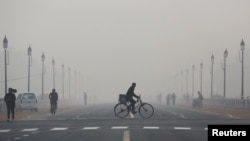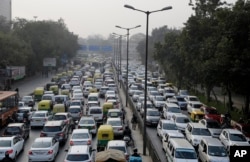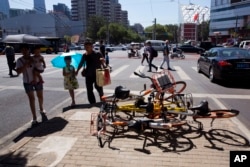A handful of Indian cities are gearing up to launch bike-sharing systems to ease traffic congestion and deadly air pollution, as urban populations surge and vehicles clog the streets.
Bike-sharing systems in the southern city of Mysuru and the central city of Bhopal, both launched last June, have met with a tremendous response, officials say.
About half a dozen more cities, including Bengaluru, Pune and Bhubaneswar, are now drawing up similar plans, according to the World Resources Institute (WRI), a Washington D.C.-based research organization.
"Bike sharing is a viable option for Indian cities — we just need good-quality bikes, dedicated lanes and a system that is efficient," said Chandramauli Shukla, chief executive of Bhopal Smart City Corporation.
The corporation implements the federally-funded Smart Cities program to improve services like internet connectivity and public transport in 100 cities across India.
With rising incomes and a large young population, passenger vehicle ownership in India has nearly tripled in the last decade, government data shows. Gridlock has become common and transit systems struggle to keep pace.
Vehicle emissions account for almost a third of air pollution in India, which has nearly half the world's 20 most polluted cities, according to the World Health Organization.
Some 2.5 million people in the country die every year due to pollution.
Mysuru, close to the technology hub of Bengaluru, was the first to introduce a bike-sharing program, with the state's chief minister riding a yellow Trin Trin bike at the launch.
Registered users can borrow any of 450 bikes from 48 docking stations for a nominal fee.
In Bhopal, users can register on their smartphones and unlock one of 500 bikes from 60 docking stations.
The city now has 11 kilometers (6.8 miles) of dedicated bike lanes, according to WRI, which provided technical expertise to the Bhopal Municipal Corporation on the bike-sharing system.
More than 25,000 people registered in the first few months, half of them women, said Amit Bhatt, director of transport at WRI India.
"In India, people look down on those who bike. So we had to show this is cool, with good-quality bikes and a mobile app to register and unlock bikes," he said.
"But the main priority is safety, with dedicated bike lanes. That has encouraged people to give it a go," he told Reuters.
Officials must be careful not to repeat the mistakes of China, where unchecked growth of bike-sharing firms led to piles of discarded bikes clogging sidewalks, Bhatt added.







